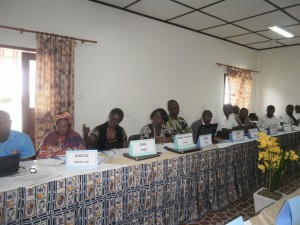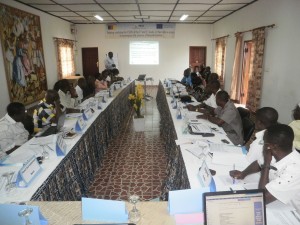Walter Wilson Nana
Buea, Cameroon
Members of the Civil Society Organisations, CSOs, who are also stakeholders in the decentralisation process in Cameroon, are worried about the snail-pace evolution of the process.
At the close of a three day training workshop for levels two and three CSOs operating in the area of decentralisation that took place in Buea recently, the thirty participants were unanimous that the efforts made by the government of Cameroon in decentralising the structures of the nation is not good enough.
Clarkson Obasi of the NGO, Help Out observed that the government of Cameroon is slow in her implementation of the decentralisation process. “It is slow like the wheels of government are always slow. May be in the next 10 – 15 years we would have had complete decentralisation in Cameroon. We are waiting to see,” he said.
The Help Out executive wished that the CSOs should be very involved in the country’s decentralisation process, noting
that certain aspects of the decentralisation process should move on faster than what currently obtains.
He prayed for a confidence building synergy between the government and the CSOs. “We should move hand-in-glove. The government listening to the CSOs and vice-versa,” he added.
According to Obasi discussions at the three-day gathering centred on how power can shift from the central government to the councils in Cameroon. “It is a gradual process, but we must work on it and move forward,’ he said.
Pamela Tarkang Manyong, Executive Director of the Buea-based CSO, Dynamic Action Group found Cameroon’s decentralisation process to be slow. “I expected the Councils to be more autonomous before now. I have realised that there is still a lot of government intervention. I am recommending that the process be driven as fast as possible. People are yet to understand what politics is all about, what the councils are all about. People must have a feel of what the councils can do for the grass root population,” she noted.
However, she expressed glee to the Civil Society Strengthening Programme known in the French acronym as PASC in the Cameroon – European Union Cooperation for embarking on a nationwide capacity building opportunities for leaders of CSOs. “My expectations have been greatly met. I did not know how to craft community needs, within the ongoing decentralisation process. But thanks to this gathering, PASC has provided us with guides on how to go about specific activities. These guides will enable you continue in the right direction, how to better support the councils and come out with development strategies for the good of the communities,” she said.
Emmanuel Njikam, Senior Monitoring Officer at PASC and leader of the training workshop for levels two and three CSOs in Buea, Southwest Region, explained the necessity for leaders of CSOs to build bridges with mayors and council authorities for the betterment of their communities.
Njikam said they are sharing views with Civil Society leaders working in the domain of decentralisation and to enhance their capacity so that they can work smoothly with the municipal councils and give good advice to their respective mayors for the growth of local development.
Besides learning key concepts in the decentralisation process in Cameroon, other modules the participants were schooled on include; laws and regulations of decentralisation, expected legal texts and current questions, organisation of municipal services, the place of CSOs in the process of decentralisation, their roles and responsibilities and methods, techniques and tools to participate in the implementation of the decentralisation process.
The PASC training workshops, which opened November 6 2013 in Yaoundé, Centre Region, will end on December 4 2013 in the South Regional capital, Ebolowa.





